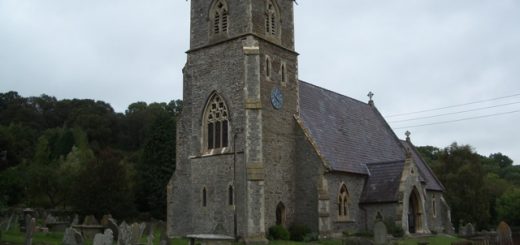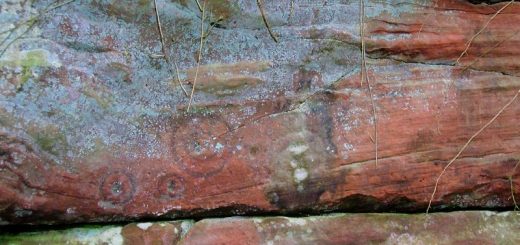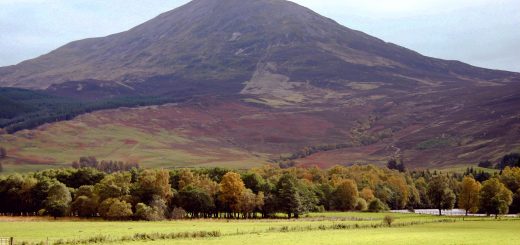St Keyne
The holy well in the village is connected with a 5th century virgin called St Keyne who performed miracles. According to ‘The Legendary Lore Of The Holy Wells Of England by Robert Charles Hope (1893)’, ‘This well is half a mile east of the interesting Decorated and Perpendicular Church of the same name, 2 ½ miles on the road from West Looe. It is a spring of rare virtues in the belief of the country people. It is covered in by masonry, upon the top of which formerly grew five large trees–a Cornish elm, an oak, and three antique ash-trees–on so narrow a space that it is difficult to imagine how the roots could have been accommodated. There now remain only two of these trees–the elm, which is large and fine, and one of the ash-trees.
 According to the legend, St. Keyne, a holy and beautiful virgin, of British royal blood, daughter of Braganus, Prince of Brecknockshire, said to have been the aunt of St. David of Wales, visited this country about 490. She was sought in marriage by men of distinction. On a pilgrimage to St. Michael’s Mount, and remaining sometime in Cornwall, she so endeared herself to the people, that she was hardly allowed to depart. Her nephew, St. Cadock, making a pilgrimage to the same place, in surprise found her, and tried to persuade her to return to Brecknockshire, which eventually she did. Cadock stuck his stick in the earth, and originated the spring, which St. Keyne gave to the people ill return for the church) which they had dedicated in her honour. One of her fancies was to reside in a wood at Keynsham. The chief of the country warned her of the venomous serpents which swarmed the wood. St. Keyne answered that she would by her prayers rid the country of snakes, and they were turned into the ammonites, frequently found in the lias rock in that district. The well is said to share with St. Michael’s Chair at the Mount the marvellous property of confirming the ascendancy of either husband or wife who, the first after marriage, can obtain a draught of water from the spring, or be seated in the chair. This mystical well is the subject of the following lines by Southey
According to the legend, St. Keyne, a holy and beautiful virgin, of British royal blood, daughter of Braganus, Prince of Brecknockshire, said to have been the aunt of St. David of Wales, visited this country about 490. She was sought in marriage by men of distinction. On a pilgrimage to St. Michael’s Mount, and remaining sometime in Cornwall, she so endeared herself to the people, that she was hardly allowed to depart. Her nephew, St. Cadock, making a pilgrimage to the same place, in surprise found her, and tried to persuade her to return to Brecknockshire, which eventually she did. Cadock stuck his stick in the earth, and originated the spring, which St. Keyne gave to the people ill return for the church) which they had dedicated in her honour. One of her fancies was to reside in a wood at Keynsham. The chief of the country warned her of the venomous serpents which swarmed the wood. St. Keyne answered that she would by her prayers rid the country of snakes, and they were turned into the ammonites, frequently found in the lias rock in that district. The well is said to share with St. Michael’s Chair at the Mount the marvellous property of confirming the ascendancy of either husband or wife who, the first after marriage, can obtain a draught of water from the spring, or be seated in the chair. This mystical well is the subject of the following lines by Southey
A well there is in the west country,
And a clearer one never was seen
There is not a wife in the west country
But has heard of the well of St. Keyne.
An oak and an elm-tree stand beside,
And behind doth an ash-tree grow,
And a willow from the bank above
Droops to the water below.
A traveller came to the well of St. Keyne,
Joyfully he drew nigh,
For from cock-crow he had been travelling,
And there was not a cloud in the sky.
He drank of the water so cool and clear,
For thirsty and hot was he,
And he sat down upon the bank
Under the willow-tree.
There came a man from the house hard by
At the well to fill his pail
On the well-side he rested it,
And he bade the stranger hail.
“Now, art thou a bachelor, stranger ?” quoth he,
“For an’ if thou hast a wife,
The happiest draught thou hast drank this day,
That ever thou didst in thy life.
Or fast thy good woman, if one thou hast,
Ever here in Cornwall been?
For an’ if she have, I’ll venture my life
She has drank of the well of St. Keyne.”
“I have left a good woman who never was here,”
The stranger he made reply,
“But that my draught should be the better for that,
I pray you answer me why.”
“St. Keyne,” quoth the Cornishman, “many a time
Drank of this crystal well,
And before the angels summon’d her,
She laid on the water a spell.
“If the husband of this gifted well
Shall drink before his wife,
A happy man henceforth is he,
For he shall be master for life.
But if the wife should drink of it first,
God help the husband then !”
The stranger stoop’d to the well of St. Keyne,
And drank of the water again.
“You drank of the well I warrant betimes?”
He to the Cornishman said :
But the Cornishman smiled as the stranger spake,
And sheepishly shook his head.
I hasten’d as soon as the wedding was done,
And left my wife in the porch
But i’ faith she had been wiser than me,
For she took a bottle to church.”




Recent Comments